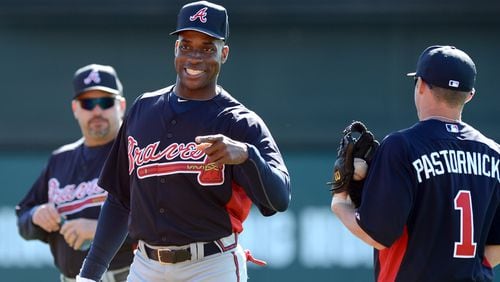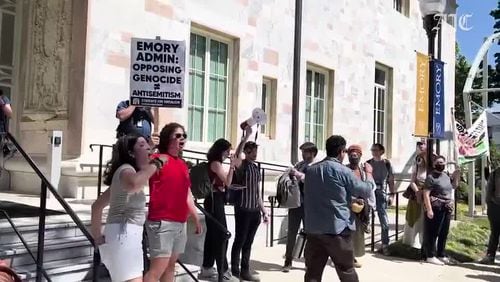Fred McGriff helped the Braves win their only World Series and has trove of other valuable experiences from a 19-year playing career. Now the former slugger is sharing what he knows with a deep group of Braves prospects the team hopes will eventually produce a player or two like him.
The 54-year-old former first baseman, who still looks fit enough to play, serves as a special assistant in baseball operations for the Braves, one of several former All-Stars employed in that capacity including the Joneses, Chipper and Andruw. A Tampa native who still lives in that city, McGriff is close enough to drive over to Braves camp on a regular basis during spring training and can often be seen in uniform, working and talking with players.
McGriff hit more than 30 home runs six times before he turned 30 and had 30 or more homers 10 times in a career spent with six teams, finishing with 493 homers, 1,550 RBIs and a .284 batting average, .377 on-base percentage, .509 slugging percentage and .886 OPS -- statistics that should be good enough for serious consideration for the Hall of Fame. It’s inexplicable that he’s never received even 25 percent of the votes in nine years on the writers’ Hall of Fame ballot.
McGriff talked with the Atlanta Journal-Constitution before a game this week in Dunedin, Fla., the spring-training home of the organization with which he began his career, the Toronto Blue Jays. This is the first part of a two-part interview, the second part -- including his thoughts on the Hall of Fame -- will run Friday on myAJC.com.
Q. Fred, you’ve had a chance to see a lot of these Braves prospects for a few years now, what are you thoughts on the development of kids like Ronald Acuna, Austin Riley, Alex Jackson and others?
A. They're coming along. I've seen them for a while now. Acuna stays hot; he's been hot for the last two or three years. He's swinging the bat well…. I was blessed to play in the big leagues for a lot of years. I know you've got to keep making adjustments, you've got to stay on your game and you've got to keep fighting all the time because you're going to have scouts and everybody else checking you out and you're going to be facing some quality pitchers every night. So those guys just have to keep making adjustments, because it can be a tough game at times. You're going to have some 0-for-10s and some 0-for-20s. It's how are you going to adjust to that.
They’re good kids. Good players. Hopefully they stay healthy and people get to see them play in Atlanta for a lot of years. But you know, we’ve been in this game for a long time and you’ve seen a lot of prospects. And that’s what they are -- they’re prospects. You’ve got to hope they survive. But they’re good kids.
Q. I know it’s probably unfair to compare him to a 10-time Gold Glove winner, but the way Acuna carries himself, does it remind you of how Andruw Jones did early in his career, kind of relaxed and confident, like he belongs even at such a young age?
A. Well, I'm sure he's watched Andruw play over the years and I'm sure Andruw is probably his idol. Probably idolizes Andruw and tries to copy-cat some of the things Andruw did. Some of his mannerisms are similar to Andruw. So he's probably patterned his game after Andruw.
Q. What about Freddie Freeman, what have you thought of him and his development as a hitter and playing your old first-base position?
A. Freddie's a good player. With Freddie it's all a matter of him staying healthy, because SunTrust Park is a great park to hit in. The ball flies out of SunTrust Park and before he got hurt last year he probably would have been MVP. I mean, he was having a big year. So with him it's always, can he stay healthy? Like all players, but Freddie especially because if you lose Freddie you're taking some big power out of your lineup. So it's important that you some kind of way keep him on the field healthy.
From a hitting standpoint, sometimes Freddie flies open (rotates shoulders toward pitcher) and his hands are exposed to getting hit by pitches. When teams are throwing inside, he makes a little move that exposes his hands (trying to get out of the way of a pitch). If you turn this way (McGriff demonstrates, turns his front shoulder and head toward the catcher) your hands are hidden and you never get hit on your hands. But if you expose them you get hit.
That’s always the sticking point, because teams are going to have to pitch him in at times, because if you keep throwing him away he keeps hitting the ball out of the ballpark. So you have to try to come in. Most of the time when you go back and look at replays, most of the time when he gets hit they’re not trying to throw at him, it's just that the ball is a little bit off the plate, and he exposes his hands and they get hit. It’s probably hard to correct it now at this point. But that’s what happens to him when he gets hit. Because you’ve got to keep him healthy.
If you turn this way (front shoulder flies open) you expose yourself to getting hit in the face, getting hit in the hands, stuff like that. If you turn the correct way, you protect yourself.”
Q. Have you talked to him about that?
A. Here and there, when I'm over at first base. But there comes a time when people are hitting good – I stay away. I don't want it to be like, "Oh, yeah, Fred is the one that got him (messed up)." Ain't going to be like that. (Laughs.) No, we talked about, "You've got a kid on the way? Good." That's what we talk about.
Q. But you’re right, most of his serious injuries have been from getting hit in the hand and wrist, things like that.
A. And it's not just him, there's more players around the league, their first move is to fly open. When I see guys get hit on the hands and the face – learn how to protect yourself.
Q. When you look at your numbers, compared to how much most guys play today do you look back and appreciate you played so many games every season? I mean, you played 150 to 160 games a year for more than a decade until you were in your mid-30s.
A. Oh, yeah. And I laugh sometimes because to me, I always wanted to play every day. You can always do something that's going to help your team out. Even if you have an 0-for-4, you being in the lineup may help get pitches for other guys to hit. Somebody like Freddie, he plays great defense, so him just being on the field, regardless of whether he gets any hits or whatever, he's valuable to the team. But nowadays they get into the – I don't know how they come up with it but it's like, "He needs a day off.
Q. And Freddie is one of the guys who wants to play every day, never take a day off if he’s healthy. Expects to play every day.
A. That's because it's like, damn, how hard is it to go out and play nine innings in a baseball game. You may the run bases, you may hit a double or a triple and you may run the bases, but you get to rest in the dugout for 15 or 20 minutes in the inning, then you go play defense, then you come back in, and how tiring can it be? If you ain't partying like a rock star after the game, then you can play.
Q. Did you find you could better stay in a groove or a rhythm when you played every day?
A. Yeah, because hitting is all timing, and so when you take that day off it throws your timing off. You try to come back and you try to get it going again, but it may take you a day or so to get it going again. That's why you always laugh because you've got these guys that take batting practice and the coach is throwing 60 miles an hour when they're throwing batting practice now, and the game starts and they're throwing a lot harder, the ball's breaking and dropping, and it ain't that easy. So yeah, you lose your timing when you take that day off….
Sometimes, like anything else, you’ve got to use your eyes (to decide who needs a day off). If you see somebody striking out every single time, then OK, that guy needs a break. It’s like, you’ve got to know the players. Because if Acuna struggles, you’ve got to give him a rest if he’s striking out a lot, he’s a rookie, first-year player, OK, let’s give him a rest. But Freddie, he’s a veteran player, he’s struck out before – you know how Freddie will have those streaks where for a two-week period he’ll strike out, he’ll struggle. So him, you can keep him in the lineup even when he’s striking out. But a younger kid, then OK, let me give him a break.
Like when I was coming up with the Blue Jays, those guys hit me seventh (McGriff smiles). They hit me sixth and seventh, they protected me. If it was a tough lefty, they protected me by hitting me seventh, because you’re not going to kill your team when you’re hitting seventh and eighth. So they’d put me there, or certain tough lefty I wouldn’t play. They would take care of me. And then slowly once my second year came around, they let me play. But there’s a way with the younger players to protect them, because it’s all mental and you don’t want their confidence shaken too much. Because in the big leagues you’re facing the best pitchers every night, so it can be tough, man.
About the Author






